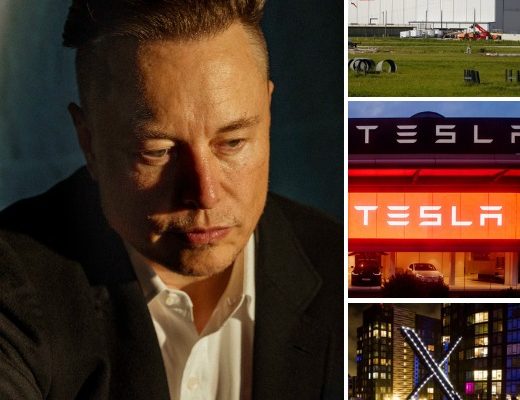In the volatile world of tech and finance, no figure embodies extremes more than Elon Musk. Often hailed as a visionary genius and simultaneously criticized as an erratic provocateur, Musk’s 2020s have been a masterclass in both astronomical success and steep decline.While some of his ventures continue to ascend to unprecedented heights—like the remarkable rise of SpaceX—others, like the platform formerly known as Twitter, now X, are suffering historic losses.As of early 2025, the numbers are staggering: X, once valued at $44 billion when Musk acquired it in 2022, has plunged by more than $35 billion, while SpaceX has surged over $140 billion in value, bringing its total valuation to an eye-watering $350 billion. These opposing trajectories offer a window into the unpredictable and controversial world of Elon Musk’s business empire.To understand the recent turmoil surrounding Musk’s portfolio, one must first look beyond the balance sheet and into the political theater in which he has chosen to participate. Once politically neutral—donating to candidates across the aisle—Musk publicly turned his back on the Democratic Party in 2022.As reported by Bloomberg, Musk declared he would “no longer vote for Democrats,” aligning himself increasingly with far-right candidates, including actively supporting Donald Trump’s 2024 reelection campaign.This shift wasn’t just ideological; it has had tangible repercussions. In an era where corporate leaders are under intense scrutiny, Musk’s increasingly polarizing presence—both online and in politics—has drawn a line in the sand for consumers and investors alike. The effects have been immediate and, in some cases, catastrophic.X: A Cautionary Tale of Mismanaged InfluenceMusk’s acquisition of Twitter in 2022 was intended to be a landmark moment—a “free speech revolution,” as he framed it. But what followed was anything but revolutionary in business terms.The $44 billion purchase quickly became a financial albatross. By late 2023, Fidelity’s Blue Chip Growth Fund valued its X shares at just $5.6 million, a sharp drop from the $19.66 million valuation at the time of Musk’s acquisition.By the end of 2024, those same shares had plummeted further to $4.2 million, according to CNN. Fidelity’s extrapolated valuation suggested that X was worth 80% less than its purchase price, implying a market value of just under $9 billion.The causes are manifold. Musk’s chaotic management style—marked by mass layoffs, advertiser exodus, and controversial reinstatements of banned accounts—alienated both users and corporate partners. Once a major hub for real-time news and cultural conversation, X has struggled to retain its relevance in a social media landscape increasingly dominated by TikTok, Instagram, and emerging decentralized platforms.Even with Musk’s AI firm, xAI, purchasing X in March 2025 for $33 billion in an all-stock deal—a $11 billion markdown from its original price—the damage had already been done. What was once the beating heart of global discourse is now a depreciating asset in a rapidly evolving media world.Tesla: A Brand in DeclineThe troubles haven’t stopped at X. Tesla, Musk’s flagship company and the pioneer of the electric vehicle (EV) revolution, has also taken a hit in 2025. The company was among the worst-performing stocks in the S&P 500 in Q1 2025, losing more than a third of its market value. Although there have been minor rebounds since, the road ahead remains rocky.The reasons are again entangled with Musk’s public persona. As Musk delves deeper into right-wing politics, liberal-leaning EV buyers—once Tesla’s core demographic—have turned away. On top of this, Trump’s uncertain trade policies, particularly the threat of renewed tariffs, have created anxiety about the cost structure of EVs in general.Furthermore, Tesla’s once-promising global market share is under siege. Sales in China, Tesla’s largest international market, dropped by 50%, and the company’s European presence is similarly weakening, amid stiff competition from homegrown manufacturers and regulatory resistance to Musk’s behavior.SpaceX: Defying Gravity—and ControversyBut not all Musk ventures are faltering. SpaceX, which remains privately held, has emerged as a crown jewel in his empire. Despite Musk’s controversies, the aerospace giant is thriving. In December 2024, CNBC reported a 67% increase in valuation, from $210 billion to $350 billion, driven by a $1.25 billion secondary share sale at $185 per share.This valuation bump isn’t just speculative. SpaceX has continued to expand its dominance in satellite communications through Starlink, while leading the world in commercial space launches. Its contracts with NASA, the U.S.Department of Defense, and various international partners remain robust, with no signs of political blowback tarnishing its business appeal.In many ways, SpaceX appears insulated from the fallout that has plagued Musk’s other ventures. Its technological achievements, such as the fully reusable Starship system and rapid launch cadence, speak louder than Musk’s online persona. For now, SpaceX remains untouchable, the gold standard of private aerospace.Neuralink: A Slow But Steady ClimbAnother venture flying just under the radar is Neuralink, Musk’s brain-computer interface company. Though its impact on Musk’s overall net worth is minor compared to SpaceX or Tesla, Neuralink has seen meaningful growth.Following its first successful human trials in 2024, Reuters reported Neuralink’s value had risen from $5 billion in June 2023 to $8 billion by July 2024. The company still faces ethical scrutiny and regulatory hurdles, but the long-term potential in neurotechnology keeps investors intrigued.xAI: Betting the Future on Artificial IntelligenceLaunched in 2023 as a direct challenge to OpenAI, xAI is Musk’s response to the rapidly advancing field of artificial intelligence. While the firm’s value was pegged at $50 billion in 2024, Musk now claims that post-X acquisition, xAI’s valuation has grown to $80 billion.This optimism may be premature. xAI’s performance is difficult to gauge outside of Musk’s own assertions. The acquisition of X gives xAI access to a vast dataset and user base, but integrating and monetizing that data remains a formidable challenge—especially with public confidence in X at an all-time low.In 2025, Elon Musk finds himself presiding over two very different kingdoms. On one side is a realm of decay, where Tesla and X struggle under the weight of public backlash and strategic missteps. On the other is a dynasty of innovation, led by SpaceX, bolstered by Neuralink, and driven forward by the promise of xAI.The $35 billion loss in X and Tesla’s sharp downturn contrast starkly with SpaceX’s $140 billion rise, reminding the world that in Musk’s orbit, fortunes can change at breakneck speed. Whether these divergent paths will converge or continue to drift apart remains to be seen. But if history has taught us anything, it’s that with Elon Musk, the only constant is unpredictability.
SH0CKING! From collapse to conquest—Elon Musk watches X lose$35,000,000,000 as SpaceX climbs to record highs $350,000,000,000.

Block 1


